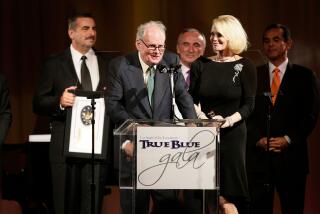A $2-Million Salute to Inspiration
- Share via
Three turning points in the life of Robert A. Hefner III have involved his high school science instructor.
As an eager ninth-grader, Hefner was so taken by Claremont teacher Raymond Alf’s enthusiasm over prehistoric bones and fossils that in 1952 he decided on a career in geology instead of architecture.
As a struggling petroleum wildcatter, Hefner took to heart Alf’s classroom admonition to think big--setting out in 1969 to pioneer a revolutionary deep-well drilling technique that tapped one of the world’s richest deposits of natural gas.
And as a successful business executive, Hefner returned to the Claremont campus Monday to thank Alf by helping future generations of young science students with a $2-million endowment in his beloved teacher’s name.
“He gets a thumbs up,” the 92-year-old Alf said with a laugh after giving Hefner a hug. The pair met in the sprawling science center at the Webb Schools--the private high school where for nearly half a century Alf left youngsters energized and amazed.
“He was a totally nonconventional teacher,” said Hefner, a 62-year-old Houston resident. “You walked into his class and never knew what hit you. But it hit, and it hit hard. And a lot of it stuck.”
Hefner’s gift is the largest individual donation in the 75-year history of the Webb Schools, an exclusive place where classes average a mere 14 students--but tuition, room and board can cost as much as $23,000 a year.
Ironically, Hefner never graduated from Webb. His mother sent him to Harvard Military Academy in North Hollywood after his freshman year.
But he was warmly welcomed when he returned to the Claremont campus Monday to confer with Webb administrators over how the endowment will be spent.
Half, it was decided, will pay for a teacher’s salary through the “Raymond M. Alf Inspirational and Unbounded Teaching Chair in Science.” The other half will annually help finance visiting experts’ lectures, new science equipment and awards to students carrying on Alf’s philosophy of “unbounded creativity.”
But before meeting with Webb school head Susan Nelson and other officials, Hefner huddled with Alf himself in the central campus circular building that reflects the old teacher’s lifetime of scholarship.
The Raymond M. Alf Museum is filled with such marvels as fossilized bones, a dinosaur egg and skeletal casts of creatures like the ancient Amphicyon bear-dog. A 15-foot slab of stone mounted on one wall contains the petrified footprints of lizard-like reptiles that crawled across a sand dune 250 million years ago in what is now Arizona.
About 90% of the museum collection consists of items gathered by Webb students on weekend and holiday archeology expeditions led by Alf from the early 1930s through his retirement in 1974.
Dozens of Alf’s former students have gone on to make names for themselves in geology, paleontology and other sciences.
One of his students from 1948, Malcolm C. McKenna, is a well-known explorer and paleontological curator of the American Museum of Natural History in New York. He also credits Alf with helping him carve out his own career.
“Ray Alf changed my life. He made it possible for us to realize how easy it was to have a new idea,” said McKenna, who was among those attending Monday’s meeting.
“His classes were always a circus. Nothing about what he did was traditional. We learned from him because it was fun.”
A student from 1959, Corona del Mar lumber company executive Kurt Dietel, recalled how Alf punctuated lectures by doing one-arm pull-ups from an overhead classroom pipe. “He was eccentric, but only in the most positive sense,” said Dietel, 55.
Alf, who lives in retirement at the Webb campus, lived up to his reputation Monday.
Asked about his former pupils, Alf rattled off an answer in Chinese--a language he learned after being born in 1905 in Canton to missionary parents.
With a grin, he translated. “They were all No. 1 students,” he said.
More to Read
Sign up for Essential California
The most important California stories and recommendations in your inbox every morning.
You may occasionally receive promotional content from the Los Angeles Times.














